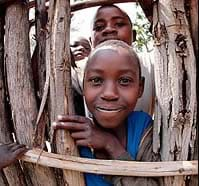Rwanda is the most improved sub-Saharan nation according to a survey looking at performances over the past five years.
The Ibrahim Index, financed by Sudanese mobile phone magnate Mo Ibrahim, names Mauritius as the best-governed and Somalia as the worst-governed state.
Harvard University academics analysed the criteria used to rank countries.
The Mo Ibrahim Foundation is next month due to award over $5m - to the former African head of state who is judged to have demonstrated exemplary leadership.
The presidential prize is also aimed at encouraging best practice.
They assembled data from various sources including the United Nations, the anti-corruption watchdog Transparency International, and thinktanks such as Freedom House.
Countries are measured under categories like "Safety and Security" and "Human Development".
When these categories are put together an overall ranking is reached.
Ranking order
BBC Africa analyst Martin Plaut says the survey's results are startling.
Who will win the $5m prize?
While finding states like Mauritius and the Seychelles at the top of the index and stateless Somalia at the bottom will come as no surprise, Africans might find others results difficult to comprehend.
Human rights organisations often portray Rwanda as a state in which the opposition is repressed and journalists harrassed and intimidated.
Doing so well perhaps indicates how much store academics put on development rather than such freedoms, he says.
Two island nations top the list of the best governed, Mauritius (Number 1) and Seychelles (2).
Both are stable, relatively wealthy states which have little in common with mainland Africa except for the fact that they are members of the African Union.
Mauritius is a sugar-exporting tourist destination which has also developed a clothing industry. It has a prominent Hindu community which looks to India as much as it does to Africa for trade and cultural ties.
Seychelles is a luxury tourist destination.
The next batch of countries on the best-governed list are more typical of the bulk of African states.
Botswana, at Number 3, is a stable democracy that earns its money from diamonds and agriculture.
Cape Verde (4) is a former Portuguese colony which survives economically from remittances by expatriate Cape Verdeans - there are said to be more Cape Verdeans in Boston, Massachusetts, than there are on the islands themselves!
South Africa (5), Ghana (8) and Senegal (9) are all vibrant democracies that are proud to have politically well-informed populations.
The BBC's Word Affairs correspondent Mark Doyle says in some senses it is high-ranking countries like these which are the role-models for the rest of mainland sub-Saharan Africa - rather then the actual winner Mauritius, which is a very particular case.
Worst-governed, according to the list - at Number 48 out of 48 - is Somalia, a country which has not had a functioning government since the overthrow of the dictator Siad Barre in 1991.
The most recent manifestation of the country's troubles has been a bloody conflict between an Islamist group and a government which, although it is recognised by the outside world, only remains in power thanks to a military intervention by neighbouring Christian-dominated Ethiopia.
Other countries scoring badly include Democratic Republic of Congo (47), Chad (46) and Mo Ibrahim's home state of Sudan (45).
Merits of prize
A spokesman for the Mo Ibrahim foundation said there was no automatic link between the "best governed country" index and the "best former president".
Mo Ibrahim has launched the index to combat corruption in Africa
But the number 2 spot given to Seychelles as a country might incline former Seychellois President France-Albert Rene, who is on the presidential longlist, to dream of a comfortable retirement.
It appears that the $5m prize awarded on 22 October will be given to an ex-president as a personal retirement gift to be paid in annual tranches, because the Mo Ibrahim foundation also states that a further sum of $200,000 per annum "may be granted" by the Foundation for "good causes espoused by the winner".
The implication of this is that the bulk of the money can be spent as the recipient chooses.
One keen observer of the African scene said granting such a large sum of money to an individual was "scandalous" and that all of it should go to causes like ending poverty on the continent.
Others said the prize had to be substantial to have any realistic prospect of actually encouraging good governance while in office - and that the $5m would spark a valuable debate in civil society about what it means to run a country well.
Nelson Mandela, a towering political figure who would almost certainly have won the prize had he retired within the stipulated 2004-2006 time-frame, said:
"This is an African initiative celebrating the successes of new African leadership. It sets an example that the rest of the world can emulate. We call for leaders across the world - in government, civil society and business - to endorse its aims and back its vision."
Source: BBC







